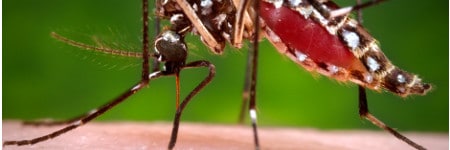 | |
|
Key Worker Resources

Protecting workers from mosquito bites can prevent diseases.
Protecting workers from mosquito bites can prevent diseases.
Zika virus disease (Zika) is caused by the Zika virus and is spread to people primarily from the bite of an infected Aedes species mosquito. These mosquitoes bite most actively in the daytime but also bite at night. There is currently no vaccine to prevent Zika infection.
NIOSH and OSHA developed guidance for protecting workers from occupational exposure to Zika virus. NIOSH has also developed fact sheets for outdoor workers, U.S. businesses and business travelers, healthcare and laboratory workers, and a fact sheet and poster for cruise ship workers. For updated Zika information visit CDC Zika.
What are the symptoms?
Where are workers at risk?
Are pregnant women at special risk?
USAID Zika Grand Challenge for Development
The U.S. Agency for International Development (USAID) launched "Combating Zika and Future Threats: A Grand Challenge for Development" to encourage ideas and innovations to help reduce the spread and impact of Zika virus and other infectious disease outbreaks. Initial results of the Grand Challenge are available.


































No hay comentarios:
Publicar un comentario